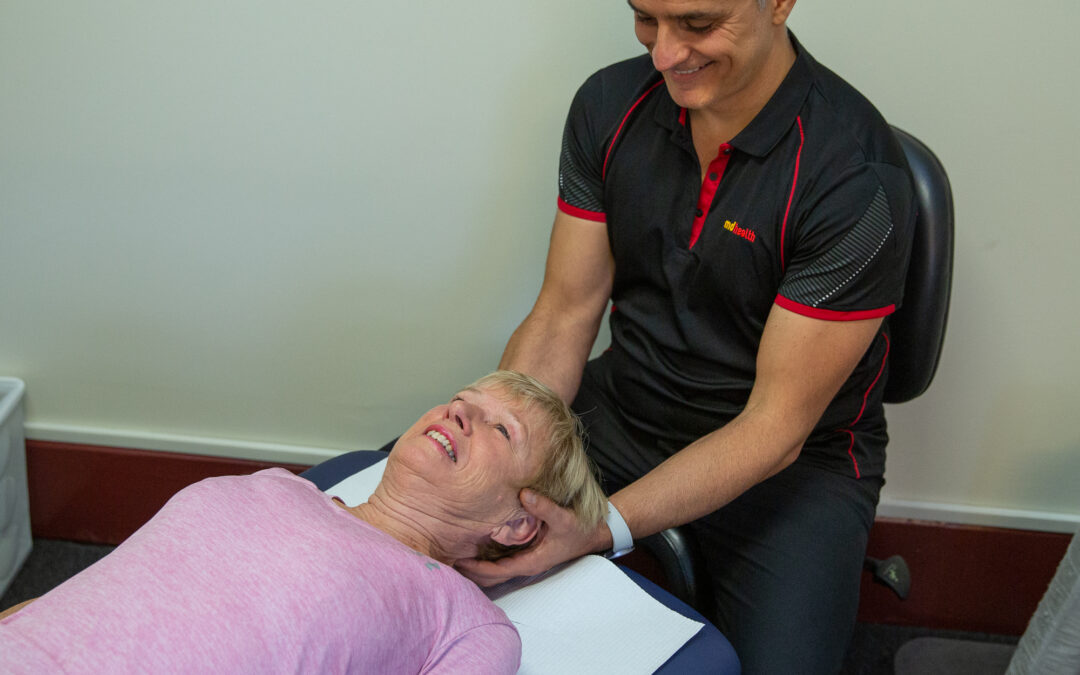You’ve probably come across the term “upper cross syndrome“ in articles and blogs as a cause of neck and upper back pain. But here’s the thing—it’s not technically a diagnosis or syndrome. Instead, it refers to a rounded upper back and forward head posture, often resulting from muscle imbalances.
Why does this happen?
The rounded posture is usually caused by two key factors:
- Weakness in upper back muscles – The muscles that stabilise the shoulder blades (like the serratus anterior, upper trapezius, and thoracic erector spinae) lose their strength and control
- Overdeveloped chest muscles – Exercises like bench press and lat pull-downs bulk up the front (pectorals and latissimus dorsi), but if you skip upper back strengthening, it throws everything out of balance
This imbalance is very common among “gym junkies” who focus on the big lifts without balancing them with stabiliser exercises for the upper back and neck.
The outcome? A painful posture
When these muscles are out of sync, the load shifts to pain-sensitive structures, such as:
- The discs in the lower part of the neck
- The small joints (facet joints) of the upper neck – stress in this area can lead to headaches
- Shoulder rotator cuff muscles – Extra load here can lead to shoulder impingement
3 key fixes for upper cross syndrome
Ready to fix your posture and reduce pain? Here’s what you can do:
1. Strengthen your upper back muscles
To regain balance, focus on strengthening the major stabilisers of the upper back and shoulder blades:
- Serratus anterior– The muscles that hold the shoulder blades to the chest wall
- Upper trapezius – The muscles that control the upward rotation of the shoulder blade to allow normal movement of the shoulder
These muscles are a major part of getting this balance right. Incorporating stabilising exercises for these muscles as part of either your Pilates routine or your regular gym/strength program is a must.
Activating them before heavy compound exercises like bench press will not only improve your posture but also boost your performance.
2. Work on your mid-back mobility
Stiffness in the mid-back (thoracic spine) also makes it difficult to maintain good upper body posture. This is very common for desk workers who spend hours sitting without changing position.
Combining mid-back mobility stretches with strengthening exercises for your upper body stabilisers will make a big impact on your posture.
Add any of these two effective exercises to any program:
- Wall angels: Exercise Sheet
- Side lying bow and arrow stretch: Exercise Sheet
3. If you have pain, seek professional help!
It’s always a great idea to consult a health professional like a physiotherapist, osteopath, or exercise physiologist.
The role of the health professional is to:
- Assess your specific issues and to make sure that you are doing the right exercises for the right problem
- Provide hands-on treatments, like stretches, mobilisation, or massage, to complement your exercise program
Remember, while manual treatments can help with symptoms, long-term results come from strengthening exercises. You’ve got to put in the work to strengthen your muscles and regain postural control.
As you improve, your health professional will continue to adjust your exercises to help you stay on track and reach your strength and posture goals.
Do you have any questions?
Call us on (03) 9857 0644 or (07) 3505 1494 (Paddington)
Email us at admin@mdhealth.com.au
Check out our other blog posts here
Our clinical staff would be happy to have chat if you have any questions.
Take the first step to a healthier you!
Would you prefer for someone to contact you regarding booking your Initial Physiotherapy appointment, Initial Exercise Physiology, Initial Osteopathy session or FREE Full Body Assessment*?
Or do you have any other enquiry about our services at MD Health?
Please fill in this form and someone from MD Health will be in touch with you soon.
Alternatively please call us on 03 9857 0644 (Kew East), 03 9842 6696 (Templestowe), 03 8683 9442 (Carlton North) or 07 3505 1494 (Paddington) to book now!
For all new clients who wish to come in for a one-off, casual or adhoc basis for Physiotherapy or Exercise Physiology the Initial Physiotherapy or Initial Exercise Physiology appointment is a paid service.
** The 13 Week Clinical Pilates Program at MD Health is not a lock in contract and you are not required to attend for the full 13 weeks if you do not wish.
Get In Touch



